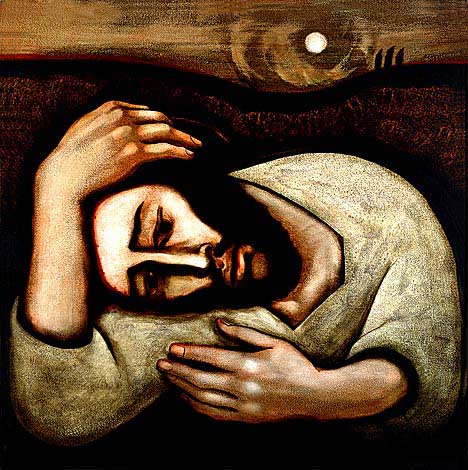
by Teresa Donati
We know that without peace, life can challenge us to the ends of our strength. Our quest for inner peace is the center of much of our prayer. Beset by our own troubles, we can easily forget how little peace there is in the larger world. The sheer grace of being able to walk down a street that is not in a war zone, that is not full of danger, is something we realize, all too often, only when it is lost.
But the next question, which is really the first question, is: how does God feel when the world is in shambles, when order and justice seem as remote as any moon?
This was the question asked by a man in the midst of the Second World War, when the unrelenting Nazi hunters attempted to kill Jews everywhere they could find them. What would God do if there were none left of His children, to praise Him and love Him?
I heard the story of this man several years ago, in New York City. At the time, I had the great honor and pleasure of hearing Rivka Miriam, an Israeli poet, give a reading in a private residence in Manhattan. The gathering was learned, eager to hear her, wonderful in their support of her art. But the stories behind the poetry were, for me, the most fascinating of all.
With her permission, I am recounting her story, which so humbles me. It is a story of a man who wanted peace not only for himself, but also wanted a way to comfort God.
During the Second World War, her father was in hiding in Poland, with four other young Jewish men. There seemed to be no way they would be saved, there seemed to be no end to the massacres of Jewish women, men, children (not to mention the slaughter of many other groups, including gypsies).
These young men became convinced that they were the last remaining Jews in Europe. Their isolation and grief was boundless.
And their next thought was: to reconstruct a prayer book, to write the prayers they remembered, so that God would not be lonely, having no Jewish Nation dedicated to His promise and Glory.
They re-wrote the prayers they said in early childhood, to construct the Siddur, the prayer book they had used in worship, so many of those books destroyed by the Nazi hatred of all things Jewish.
Imagine: in the conviction of the men that they, the five, were the last Jews, that they must console God! Can the depths of their holiness ever be measured? I was awed by this story; hearing the way these men, fearing their own discovery and death, feared even more for the loneliness of God.
May I know such holiness. May my heart be filled with their love of God. May the world be so filled, so that we live in peace. May it begin with me.
Teresa Donati is Professor of Sociology (Emeritus) at Fairleigh Dickinson University, now engaged in full-time writing, including church issues, and Christian fiction.
image: “Christ in Gethsemane”, by Michael D. O’Brien

